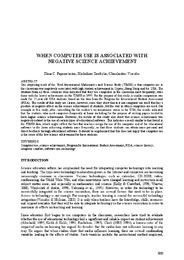When computer use is associated with Negative science achievement

View/
Date
2003Publisher
Department of Educational Sciences, University of CyprusPlace of publication
CY - ΛευκωσίαSource
CBLIS Conference Proceedings 2003 Volume I: New Technologies and their applications in educationGoogle Scholar check
Keyword(s):
Metadata
Show full item recordAbstract
One surprising result of the Third International Mathematics and Science Study (TIMSS) is that computer use in the classroom was negatively associated with high student achievement in Cyprus, Hong Kong and the USA. The students from all three countries who indicated that they use computers in the classroom most frequently, were those with the lowest achievement on the TIMSS in 1995. For the purpose of this study, a similar comparison was made for 15-year-old USA students, based on the data from the Program for International Student Assessment (PISA). The results of this study are clearer, however, since they show that it is not computer use itself that has a positive or negative effect on the science achievement of students, but the way in which computers are used. For example in this study, after controlling for the student’s socioeconomic status in the USA, the results indicated that the students who used computers frequently at home including for the purpose of writing papers tended to have higher science achievement. However, the results of this study also show that science achievement was negatively related to the use of certain types of educational software. This indicates a result similar to that found in the TIMSS data, which might reflect the fact that teachers assign the use of the computer and of the educational software to the lower achieving students more frequently, so that these students can obtain more personal and direct feedback through educational software. It should be emphasized that this does not imply that computer use is the cause of the low science achievement for these students.
